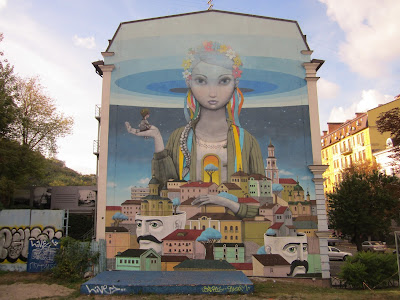Review (#6): Yuriy Shcherbak's "The Chronicle of Yaropol Town" (1968)
By Péter MARTON
Those following this blog will already know that I'm a fan of Yuriy Shcherbak – I praised him both as a writer and as a person (due to his parallel careers as epidemiologist scholar and writer, which he topped off with a role in politics and diplomacy in post-Soviet independent Ukraine).
It would be a let-down if I wouldn't write here about one of his best-known works, "The Chronicle of Yaropol Town" (Хроніка міста Ярополя in Ukrainian). This was written after Quarantine, and takes Shcherbak and us way outside the world of the science lab. It is not genre stuff (Quarantine wasn't that, either, of course), but it contains fantastic as well as SF elements.
Shcherbak shows much technical skill here again in the sense of building complex and nicely written text, but apart from this his work is found wanting in certain respects. For one, all that technical skill comes at the price of some needless mannerisms loading the text and, at times, convoluted writing (really only at times, fortunately).
According to the introduction, the narrator is to recount to us, in retrospect, certain episodes from the history of the town of Yaropol – a fictive place that therefore suitably represents all Central/Eastern European and especially Ukrainian towns that went through the turbulence of the 20th century. A problem with the way this idea is implemented is that in spite of the connections built between the stories (which are fine and well-placed), these stories mostly stand on their own and do not benefit from the extra layer of narrative super-imposed on them by the figure of the chronicler. It is rather redundant, really. Moreover, some of the stories are not as strong as the others. (Second and third stand out in a negative sense, to me – in the third, we have a character that magically takes off to escape the constraints of a situation, something that characters should rarely, if ever, be made to do by authors.)
The SF or quasi-SF elements (biological and medical) are added mostly for surreal effect, such as the idea of feeding off the nitrogen in the air, to illustrate in a grotesque way the near-impossibility of surviving in a WW2 German forced labour/concentration camp where the work regime was invented to demand so much energy that it would exceed several times the daily calorie intake of the forced labourers – to make sure they died, and that they died in a way that was useful for the German Reich (this is in the fourth story in the volume). In another case, an SF idea (about the way one's blood cells deal with burn wounds) is brought in to explain the fate of a talented boxer – and to bring up philosophical dilemmas (the last story in the book).
Do I care much about borders between genres? Nah. No way. Do I care if SF is an excuse to express something else? Yes, I do, and I appreciate the creativity! So it is exactly the above two stories that I liked the most. In addition, the last one comes strongly connected to the first in the volume – and together they convey Shcherbak's most important message to the reader. Whereas in Quarantine he dissects a situation in which a small circle of people find themselves in a crisis, to argue in favour of a healthy humanism that seeks a balance between acting for "Humanity" and "one's actual fellow human beings," here he starts out from the bigger picture – the chaos and violent turns of Central/Eastern Europe's history – to conclude in a very similar way. So Shcherbak, in the Soviet Union of the 1960s, was writing in favour of discarding all big historical narratives, to focus only on the needs and the suffering of people and to avoid the traumas witnessed in the 20th century. This is very sympathetic.
Even if it has its flaws, the above stories and message make this a book I couldn't help but like eventually. And it definitely has that difficult-to-describe essence of Central/Eastern Europe in it. And even the spirit of 1968, with the fifth story in the book... I'm getting enthusiastic just talking about this, see?
Previously reviewed here on EUtopias and Other Futures: Yuriy Shcherbak's Quarantine (novelette, 1966)
Previously reviewed here on EUtopias and Other Futures: Yuriy Shcherbak's Quarantine (novelette, 1966)




Comments
Post a Comment